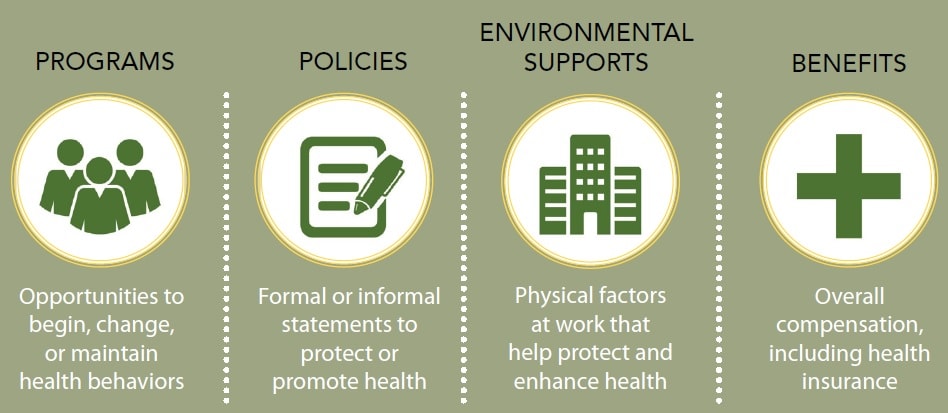2020 Employer Heart Disease and Stroke Program Profile
The CDC ScoreCard is a tool to help employers assess whether their health promotion programs are based on the best evidence for improving employees’ health and wellness.
What Evidence-Based Practices Does the ScoreCard Assess?

Cardiovascular disease is America’s costliest disease—approximately $363 billion annually in direct and indirect costs in 2016-2017.1 Indirect costs—including missed workdays—cost about $147 billion each year.1 High blood pressure and high blood cholesterol put individuals at high risk for heart disease and stroke. You cannot tell who has high blood pressure or high blood cholesterol levels just by looking at them, but about 1 in 2 US adults have high blood pressure.2
How Are Employers Doing in Promoting Heart Health?
28% of employers have a comprehensive workplace blood pressure control programs including education, environmental support, and benefits strategies.
71%, or 340 worksites have an emergency response plan to address acute heart attack and stroke events.
On average, employers have (60%), or 3 of 5 High Cholesterol Prevention ScoreCard strategies in place.
- Virani SS, Alonso A, Aparicio HJ, Benjamin EJ, Bittencourt MS, Callaway CW, , et al. Heart disease and stroke statistics-2021 update: a report from the American Heart Association. Circulation. 2021;143: e00 –e006. DOI: 10.1161/CIR.0000000000000950.
- Centers for Disease Control and Prevention (CDC). Hypertension Cascade: Hypertension Prevalence, Treatment and Control Estimates Among US Adults Aged 18 Years and Older Applying the Criteria From the American College of Cardiology and American Heart Association’s 2017 Hypertension Guideline—NHANES 2015–2018. Atlanta, GA: US Department of Health and Human Services; 2019. https://millionhearts.hhs.gov/data-reports/hypertension-prevalence.html. Accessed March 12, 2021.
Heart Disease and Stroke Prevention Strategies |
Strategy a |
% of Worksites b With Strategies in Place (2020 Score) |
|---|---|---|
| Cardiopulmonary Resuscitation (CPR) and Automated External Defibrillator (AED) | Offer access to a nationally recognized training course on Cardiopulmonary Resuscitation (CPR) that includes training on Automated External Defibrillator (AED) usage | 78% |
| Automated External Defibrillator (AED) | Have one or more functioning AEDs in place | 78% |
| Prescription Insurance | Provide health insurance coverage with free or subsidized out-of-pocket costs for blood pressure control medications | 75% |
| Prescription Insurance | Provide health insurance coverage with free or subsidized out-of-pocket costs for cholesterol or lipid control medications | 75% |
| Educational Materials | Provide educational materials on preventing and controlling high blood pressure | 68% |
| Educational Materials | Provide educational materials on preventing and controlling high cholesterol | 61% |
| Free or Subsidized Counseling | Provide and promote free or subsidized lifestyle coaching, counseling, or self-management programs that equip employees with skills and motivation to set and meet their personal blood pressure management goals |
59% |
| Free or Subsidized Counseling | Provide and promote free or subsidized lifestyle coaching, counseling, or self-management programs that equip employees with skills and motivation to set and meet their personal cholesterol management goals | 58% |
| Blood Pressure Screenings | Provide free or subsidized blood pressure screening, beyond self-report, followed by directed feedback and clinical referral when appropriate | 57% |
| Educational Programs | Provide and promote interactive educational programming on preventing and controlling high blood pressure | 53% |
| Educational Programs | Provide and promote interactive educational programming on preventing and controlling high cholesterol | 49% |
| Cholesterol Screening | Provide free or subsidized cholesterol screening, beyond self-report, followed by directed feedback and clinical referral when appropriate | 44% |
| Blood Pressure Monitoring | Make blood pressure monitoring devices available with instructions for employees to conduct their own self assessments | 34% |
a Evidence-based practices (i.e., programs, policies, environmental supports, and benefits) in the CDC Worksite Health ScoreCard have a weighted score from 1 to 3 points. The score is derived from the strategy’s impact on population health outcomes and the strength of the supporting scientific evidence.
b Percentages are based on 480 ScoreCard submissions in 2020.